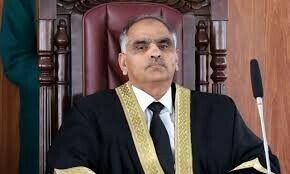ISLAMABAD: The Judicial Commission of Pakistan (JCP) could have deferred its deliberations on the elevation of Justice Mohammad Ali Mazhar to the Supreme Court for a second time on July 28 had the premier bars avoided a threatening posture, said an informed source while talking to Dawn on Friday.
The JCP had put on hold deliberations over the matter during its previous meeting (July 13) in view of reservations expressed by the lawyers’ community that Justice Mazhar’s elevation would amount to bypassing the seniority principle.
But when the commission met on Wednesday, the situation had reached a stage where another adjournment of the proceedings could have been construed as a weakness, according to the source.
The Pakistan Bar Council (PBC), the premier regulatory body of lawyers, as well as other bar councils and associations gave a call for observance of a black day and strike on July 28 — the day when the JCP held its session to consider the appointment of Justice Mohammad Ali Mazhar of the Sindh High Court.
The JCP opted for a vote count after an over two-hour session marred by an exchange of incendiary language, the source said.
On July 28, by a majority of five to four, the JCP had approved the nomination of Justice Mazhar to the Supreme Court — a decision that invited a strong disapproval from the PBC.
The council has called a general body meeting of all the provincial bar representatives on Aug 5 to discuss the matter.
The bar has every right to raise its concerns, but under the existing rules, the Chief Justice of Pakistan had the right to make nominations for appointment as judges of superior courts, the source emphasised.
It would have been much better had the PBC nominated senior counsel Akhtar Hussain as its representative to the JCP when his first tenure came to an end in June, days before the July 13 session.
The PBC should have conveyed its concerns before the first meeting (July 13) instead of attending the second meeting (July 28) after giving a call for strike and demonstrations, the source was of the opinion.
The Supreme Court, through its judgements in the 1996 Al Jihad and the 1998 Malik Asad Ali cases, had emphasised adherence to the seniority principle for the appointment of judges. But the same court held in the 2002 Supreme Court Bar Association case that seniority was not the only benchmark for appointments in the Supreme Court.
And through the 2002 Faqir Khokhar case, the apex court had held that elevation in the Supreme Court was always considered to be a fresh appointment and, therefore, even a junior judge from a high court could be elevated to the apex court, the source recalled.
He cited the examples of Justice Munib Akhtar, Justice Mazahir Ali Akbar Naqvi, Justice Aminuddin Khan and Justice Qazi Amin Ahmed to argue that Justice Mohammad Ali Mazhar’s elevation was not the first instance in which a high court judge other than the most senior one went on to become a judge of the apex court.
There is all likelihood that after a few months, the incumbent Chief Justice of SHC, Ahmed Ali Sheikh, would be appointed as an ad hoc judge of the Supreme Court since with the elevation of Justice Mazhar, the court will be at its full strength — 17.
The nomination, however, has to be approved by the Parliamentary Committee — an eight-member bipartisan body of MNAs and senators — under Article 175-A of the Constitution.
The source said two senior puisne judges of the Sindh High Court — Justice Irfan Saadat Khan and Justice Aqeel Ahmed Abbasi — deserved to be the chief justice of SHC. The source further recalled that contrary to its current stand, the PBC had concluded during a meeting on May 7 that seniority was not enough for elevation to the Supreme Court and that there should be no compromise on competence and integrity.
The PBC had also stated that the Supreme Court was not a “dumping ground” for appointment of incompetent judges merely on the basis of seniority.
Only the best from amongst the high court judges should be elevated to the Supreme Court on the basis of competence, integrity and performance, and not simply seniority, the PBC had stated.
Published in Dawn, July 31st, 2021

















































